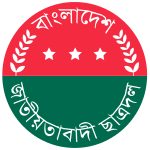Bangladesh Jatiotabadi Chatra Dal
| Jatiyatabadi Chhatra Dal | |
|---|---|
 | |
| President | ..... .....x...... |
| Founded | 1979 |
| Headquarters | 28/1 New Paltan, Dhaka |
| Ideology | Nationalism, Progressiveness |
| Mother party | Bangladesh Nationalist Party |
Bangladesh Jatiotabadi Chatra Dal (Bengali: জাতীয়তাবাদী ছাত্রদল Jatiyôtabadee Chhatrô Dôl),[1] also known as J.C.D, is the student wing of the Bangladesh Nationalist Party (BNP).[2] Many of the top BNP leaders and policy-makers today were once closely associated with JCD and developed as student leaders.
After the Bangladesh Nationalist Party was founded by Ziaur Rahman, he realized a strong student organization was needed to cherish future leaders, and founded Chhatra Dol on 1 January 1979. Rahman's popularity as a radical reformer attracted many students to the organization. As the student wing of the BNP, Chatra Dal has adopted a 19-point programme, based on the mother organization's structure and approach.[3]
Bangladesh Jatiotabadi Chatra Dal is led by a committee, of whom all the members are students.
Bangladesh Nationalist Party (BNP) was founded on 1 September 1978 by President Ziaur Rahman, who had come to power in a military coup. He wanted to provide more civilian influence, and on 30 April 1977 initiated a 19-point programme of action.
The main objectives of the party have been the economic development, democratic advancement, national unity on the basis of Bangladeshi nationalism and generation of a spirit of self-reliance in the people. The four fundamental principles of State policy, i.e. the principles of absolute trust and faith in the Almighty Allah, nationalism, democracy, and socialism meaning economic and social justice, have been its core values.
When BNP was established as a political party, the nation was still divided from the effects of the Liberation War of 1971, when it had become independent from Pakistan. Much of society was divided by those who had favored or opposed independence, and the mass murders and atrocities had left many victims. The BNP intended to work to reconcile the groups and factions.
The BNP has held power in Bangladesh for five separate terms. Among its leaders, four have become President of Bangladesh, and two have become Prime Minister of Bangladesh. Within the party, power has remained exclusively in the hands of the Zia family, with Begum Khaleda Zia leading the party since the assassination of Ziaur Rahman, her husband and the party's founder.
In the 1991 general elections that followed, BNP emerged as the single largest party, securing 140 seats in the Parliament and assumed in office. The BNP government took initiative in re-introducing parliamentary system of government in Bangladesh. In the general elections of 2001, BNP led a 4-party alliance and won a landslide victory, winning more than two-thirds in the Parliament. It formed the government.
See also
References
- ↑ "Constitution of JCD". jcd-bnp.org. Retrieved 2015-08-04.
- ↑ "Bangladesh National party". bnpbd.org. Retrieved 2015-08-04.
- ↑ "Bangladesh National party". bnpbd.org. Retrieved 2015-08-04.
External links
- Official Website
- News-feed of Bangladesh Nationalist Party
- Bangladesh Jatiotabadi Chatra Dal on Twitter

- Bangladesh Jatiotabadi Chatra Dal on Facebook
- Bangladesh Jatiotabadi Chatra Dal on Facebook
- Facebook Page of Begum Khaleda Zia